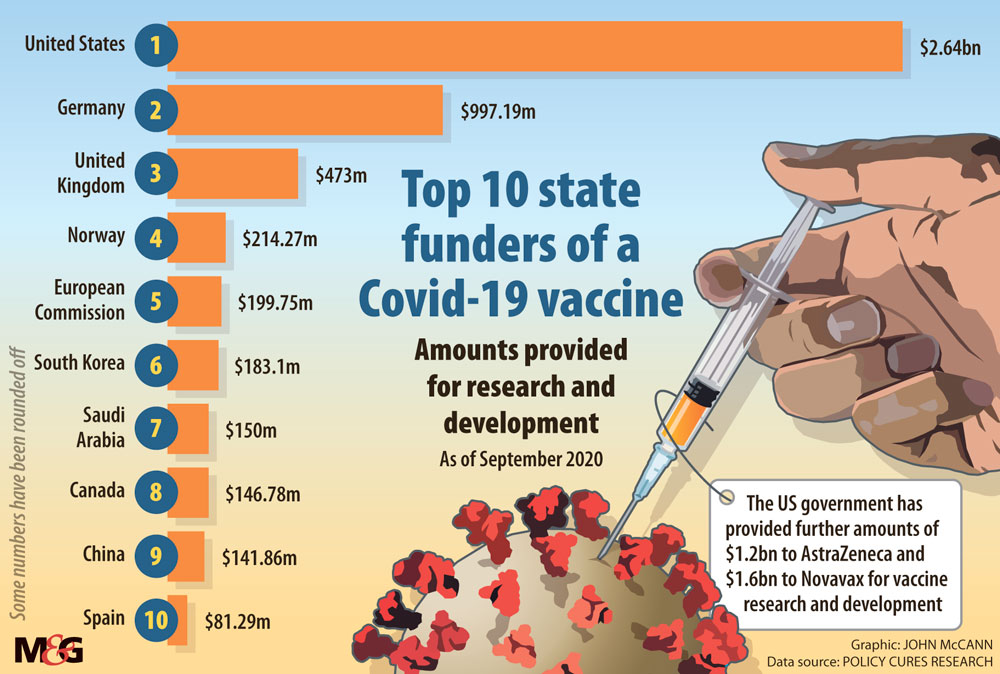Africans can lead the charge to decolonise the profit-driven biomedical system by challenging European and American claims to prioritised access to the Covid-19 vaccine.
People over profits. That’s the resounding call from human rights activists and public health experts as the world anxiously awaits the development and release of Covid-19 vaccines that are safe to use and that work.
But the secrecy under which some governments — especially of high-income countries — are preordering future vaccine doses undermines universal and equitable vaccine access, a new report by Human Right Watch states.
Secrecy and back-door dealings are the order of the day amid expert projections that there will be a shortage of supply of a viable vaccine, the report adds.
“In the high-stakes race for a potential vaccine, commitments to meet human rights obligations and transparency have been largely absent. Funding for Covid-19 vaccines with public money has been mired in secrecy. Rich governments that can afford to do so are negotiating opaque bilateral deals with pharmaceutical companies or other entities, often reserving future doses of vaccines largely for their exclusive use,” the report reads.
The 62-page report, titled Whoever Finds the Vaccine Must Share It: Strengthening Human Rights and Transparency around Covid-19 Vaccines, examines three significant barriers to universal and equitable access to any vaccine that is found to be safe and effective: transparency, supply, and pricing.
Affordability is crucial
Numerous high-income countries that have used public money to fund vaccine trials and are prepaying for potential vaccines are going against the international human rights standards that require countries to be transparent and forthcoming about the scientific research and developments, to ensure the larger global community can afford the doses as well.
The report features interviews with global experts on access to medicines, intellectual property (IP), and human rights, and analysed international human rights law, national laws and policies.
It also argues that, like other infectious diseases, Covid-19 can spread rapidly across borders and that future vaccines may not provide lasting immunity, potentially leaving countries vulnerable to repeated cycles or waves of infection.
“The protection of any one country’s population from Covid-19 is highly dependent on and interconnected to the protection of populations in other countries.”
With only 10 vaccine candidates in the final stages of clinical trials as of 19 October, rich countries such as the United States, Germany and South Korea are already investing enormous amounts of public money into Covid-19 vaccine research and development.
But low and middle-income countries are not taking this lying down.
“Governments should support India and South Africa’s proposal to waive some aspects of global IP rules to enable large-scale manufacturing and make vaccines affordable for all,” the human right organisation states.
Earlier this month, South Africa and India jointly proposed to the World Trade Organisation that some provisions of the agreement on trade-related aspects of intellectual property rights (Trips) should be waived to allow countries to collaborate on the scientific knowledge and technologies being used to find a viable vaccine.
 (John McCann/M&G)
(John McCann/M&G)
Human rights before hoarding
In the report, Human Rights Watch stipulates that the human rights obligation of all governments is to ensure that the research developments towards a vaccine — especially in cases where public money is used to fund this research — are shared as widely as possible to protect people’s lives, health, and livelihoods.
The organisation also argues that using public money without reporting the terms and conditions under which the money is used undermines the human rights principles of transparency and accountability.
“Governments should urgently band together, be transparent, and cooperate to share the benefits of the scientific research they fund to help humanity,” said Aruna Kashyap, senior business and human rights counsel at Human Rights Watch and co-author of the report.
“More than a million people have died and another million are projected to die by the end of the year. Governments should use their funding and regulatory powers to ensure that corporate profit doesn’t determine who can get vaccines.”
As early as August, experts and activists in South Africa were raising concerns over the potential for pandemic profiteering that could happen and that would be fuelled by richer countries wanting to hoard doses of every effective vaccine.
The lack of political will and the “vested interests” of government and political leaders could be what stands between a life-saving vaccine and South African, veteran human rights lawyer Fatima Hassan said at the time.
Hassan was also one of the experts interviewed in the Human Rights Watch report and once again warned that it’s up to governments to exercise their regulatory powers that ensure that pharmaceutical companies share IP and research data through open and non-exclusive licensing for an equitable and just distribution of a vaccine when it’s available.
“How vaccines are distributed will expose the divides by race, class, and economic power … Many clinical trials like those in South Africa are benefiting from public funding and countries are participating with the hope that they will get preferential access to vaccines,” she added.
“If we rely on the benevolence of the pharmaceutical industry, we’re not guaranteed access.”
Meanwhile, vaccine pricing — which is in the hands of pharmaceutical companies — poses a threat to universal and equitable vaccine access.
The report recommends that governments funding Covid-19 research with public funds should require companies to adopt transparent pricing verified by third-party audits; create a public database of all contracts for funding related to Covid-19 vaccine research, development, manufacturing and distribution as well as develop a consultative process with a diverse set of civil society groups working on public health and human rights issues.
“You can’t fight a pandemic by allowing publicly funded vaccines to go to the highest bidder, at whatever price pharmaceutical companies set,” said Margaret Wurth, a senior children’s rights researcher at Human Rights Watch and a co-author of the report.
“When a safe and effective vaccine is found, it should be available and affordable for everyone, everywhere.”